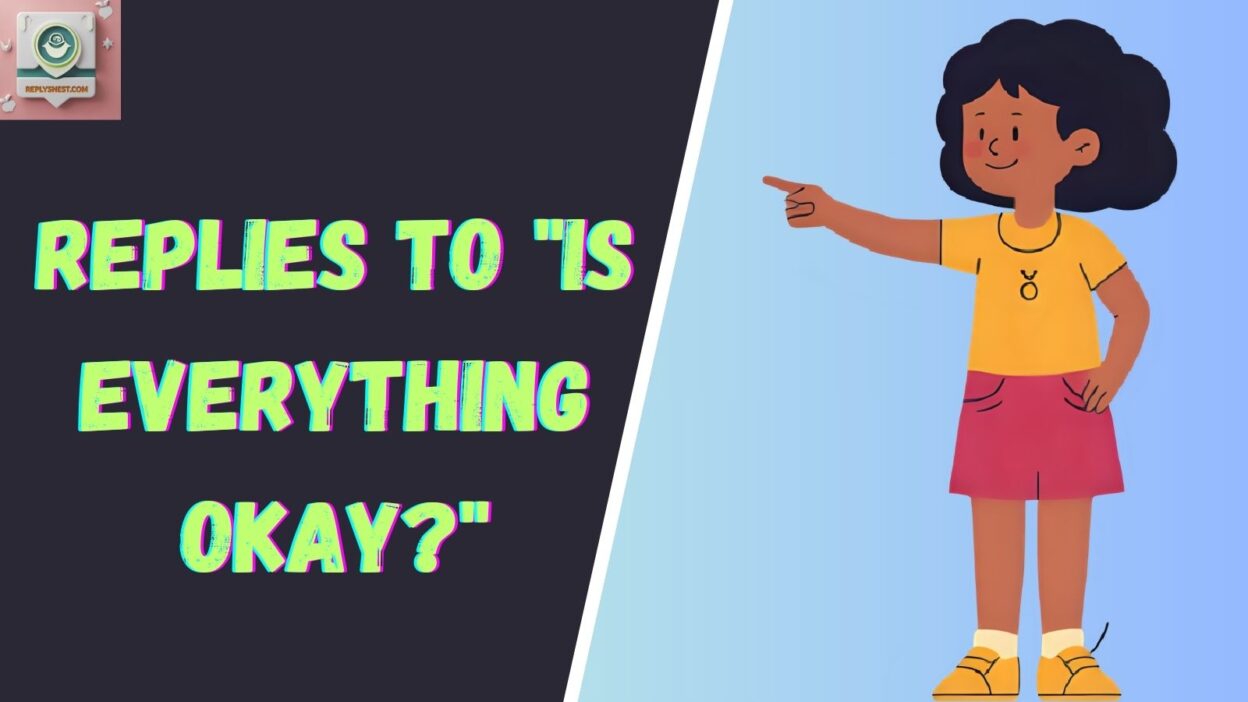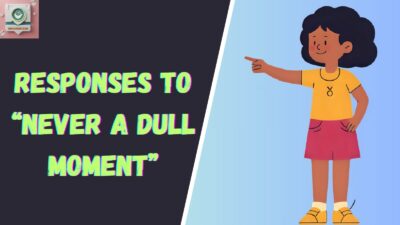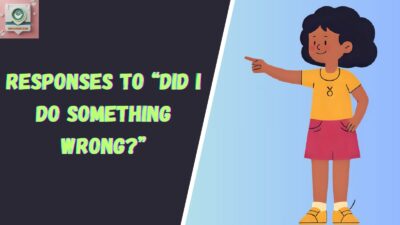When someone asks you “Is everything okay?”, it usually means they’ve noticed something in your tone, expression, or behavior. Sometimes you genuinely are okay, but other times you’re not and don’t want to overshare. Knowing how to reply in a way that feels warm, thoughtful, and caring can help you maintain genuine connections while also protecting your personal space. Replies to “Is Everything Okay?”.
There are times when a conversation feels too much, and you just want a brief way out. With acquaintances or in a casual chat, keeping it polite and straightforward is key. I’ve noticed on platforms like Quora, people often suggest classic short answers like “I’m fine” or “All good.”
These keep things simple without going into details, and they let the other person know you’re not offering more. According to my own habit, a quick “Thanks for asking, I’m okay” is the way I turn things back when I don’t want the conversation to drag.
Sometimes, the direct route works best. A short “Yeah, everything’s good” signals you’re done, while still sounding polite. This approach is helpful when the chat turns into something you don’t want to extend. It’s not rude—it’s just a classic tool for saving your time and energy while staying respectful.
1. “I’m okay, thank you for asking.”
Best use: When you want to acknowledge concern without giving details.
Not to use: If you’re truly struggling and need support.
Other ways to say: “I’m fine, thanks for checking in.” / “Doing alright, appreciate it.”
Example: Friend: “Is everything okay?” You: “I’m okay, thank you for asking—it means a lot.”
Read More: Funny Roasts to Say to a Bully
2. “I’ve had better days, but I’ll be fine.”
Best use: When you’re not at your best but want to stay optimistic.
Not to use: If you don’t want to invite follow-up questions.
Other ways to say: “Not my best day, but I’ll get through.” / “It’s been rough, but manageable.”
Example: Coworker: “Is everything okay?” You: “I’ve had better days, but I’ll be fine.”
3. “I’m hanging in there.”
Best use: When you want to be honest but brief.
Not to use: If you’re completely fine and cheerful—it may confuse the other person.
Other ways to say: “Getting by.” / “Managing, thanks.”
Example: Neighbor: “Is everything okay?” You: “I’m hanging in there, thanks for noticing.”
4. “I appreciate you asking. It’s been a little stressful.”
Best use: When you want to open up just a bit.
Not to use: If you don’t want to discuss stress or details.
Other ways to say: “It’s been overwhelming, but I’m grateful you asked.”
Example: Colleague: “Is everything okay?” You: “I appreciate you asking. It’s been a little stressful lately.”
5. “Yes, everything’s fine—how about you?”
Best use: To reassure and shift focus politely.
Not to use: If you actually need to talk.
Other ways to say: “I’m good, thank you. How are you doing?”
Example: Friend: “Is everything okay?” You: “Yes, everything’s fine—how about you?”
6. “I could use a little encouragement today.”
Best use: When you’re being honest and seeking comfort.
Not to use: If you don’t want emotional support.
Other ways to say: “A pep talk would help right now.” / “I’d love some positivity.”
Example: Sibling: “Is everything okay?” You: “I could use a little encouragement today.”
7. “It’s been a long day, but I’m managing.”
Best use: When you’re tired but don’t want pity.
Not to use: If you’re actually doing great—it’ll sound off.
Other ways to say: “Exhausted, but alright.”
Example: Boss: “Is everything okay?” You: “It’s been a long day, but I’m managing.”
8. “I’m not at my best, but I’ll get there.”
Best use: When you want to show resilience.
Not to use: If you want to completely avoid the topic.
Other ways to say: “A bit off today, but I’ll be okay.”
Example: Friend: “Is everything okay?” You: “I’m not at my best, but I’ll get there.”
9. “I’m okay—thanks for caring.”
Best use: To show gratitude without details.
Not to use: If you dislike emotional talk.
Other ways to say: “I appreciate your concern.”
Example: Coworker: “Is everything okay?” You: “I’m okay—thanks for caring.”
10. “I’d rather not get into it right now.”
Best use: When you need privacy.
Not to use: If you don’t want to seem dismissive with close loved ones.
Other ways to say: “I’ll talk about it later.”
Example: Friend: “Is everything okay?” You: “I’d rather not get into it right now.”
11. “I’m still figuring that out myself.”
Best use: When you’re uncertain about your emotions.
Not to use: If you want to appear composed in professional settings.
Other ways to say: “Not sure yet, still processing.”
Example: Family member: “Is everything okay?” You: “I’m still figuring that out myself.”
12. “I’m better than yesterday, so progress!”
Best use: When you want to show improvement.
Not to use: If today is actually worse.
Other ways to say: “One step at a time.”
Example: Friend: “Is everything okay?” You: “I’m better than yesterday, so progress!”
13. “I don’t feel like myself today.”
Best use: When you’re being honest but vague.
Not to use: If you want to avoid concern.
Other ways to say: “Off day today.”
Example: Colleague: “Is everything okay?” You: “I don’t feel like myself today.”
14. “Yeah, just a lot on my plate right now.”
Best use: When stress is the issue.
Not to use: If you’re perfectly fine.
Other ways to say: “Busy, but okay.”
Example: Friend: “Is everything okay?” You: “Yeah, just a lot on my plate right now.”
15. “I’m coping, thanks for asking.”
Best use: When you want to sound resilient.
Not to use: If you don’t want to invite more questions.
Other ways to say: “Managing as best I can.”
Example: Neighbor: “Is everything okay?” You: “I’m coping, thanks for asking.”
16. “I’m feeling a bit overwhelmed.”
Best use: When you want to be open.
Not to use: In a strictly professional setting.
Other ways to say: “It’s a little too much right now.”
Example: Coworker: “Is everything okay?” You: “I’m feeling a bit overwhelmed.”
17. “Everything’s fine, promise.”
Best use: To reassure quickly.
Not to use: If you’re clearly upset—people may not believe you.
Other ways to say: “All good, I swear.”
Example: Friend: “Is everything okay?” You: “Everything’s fine, promise.”
18. “Not really, but I’ll be okay.”
Best use: When you’re honest but hopeful.
Not to use: If you don’t want to open up.
Other ways to say: “It’s tough, but I’ll manage.”
Example: Sibling: “Is everything okay?” You: “Not really, but I’ll be okay.”
19. “I’m grateful you asked—it means a lot.”
Best use: To emphasize appreciation.
Not to use: If you want to shut the conversation quickly.
Other ways to say: “I really value your concern.”
Example: Friend: “Is everything okay?” You: “I’m grateful you asked—it means a lot.”
20. “Yes, just in deep thought.”
Best use: When you seem distracted but are fine.
Not to use: If you’re visibly upset.
Other ways to say: “Just lost in thought.”
Example: Colleague: “Is everything okay?” You: “Yes, just in deep thought.”
21. “I could use a break, honestly.”
Best use: When exhaustion is showing.
Not to use: If you don’t want to sound tired.
Other ways to say: “A pause would help.”
Example: Coworker: “Is everything okay?” You: “I could use a break, honestly.”
22. “Yes, everything’s good—thank you for noticing.”
Best use: Warm reassurance with gratitude.
Not to use: If things really aren’t okay.
Other ways to say: “All good here, thanks for checking in.”
Example: Friend: “Is everything okay?” You: “Yes, everything’s good—thank you for noticing.”
23. “It’s been a rollercoaster, but I’m hanging on.”
Best use: When you want to be honest with humor.
Not to use: In formal settings.
Other ways to say: “Ups and downs, but I’m here.”
Example: Sibling: “Is everything okay?” You: “It’s been a rollercoaster, but I’m hanging on.”
24. “I’m okay—what about you?”
Best use: To shift the focus.
Not to use: If you want to talk about yourself.
Other ways to say: “I’m alright. How are you doing?”
Example: Colleague: “Is everything okay?” You: “I’m okay—what about you?”
25. “Not the best day, but tomorrow’s a new start.”
Best use: To stay positive.
Not to use: If you don’t want to talk about your mood.
Other ways to say: “Bad day, better tomorrow.”
Example: Friend: “Is everything okay?” You: “Not the best day, but tomorrow’s a new start.”
Conclusion
When someone asks “Is everything okay?”, it’s often their way of showing care. The right response depends on your comfort level and relationship with the person. Whether you want to keep things light, be honest, or show gratitude, these 30 replies give you versatile, warm, and thoughtful ways to respond.
From my own experience, I’ve learned that sometimes even a small acknowledgment like “Thanks for asking” can deepen trust and make someone feel closer to you. Other times, setting boundaries with “I’d rather not get into it right now” protects your peace. The beauty is—you get to choose the balance.
Editor’s Picks: Top 10 Replies People Love
- “I’m okay, thank you for asking.” – Simple, polite, and versatile.
- “Yes, everything’s fine—how about you?” – Shifts focus kindly.
- “I’ve had better days, but I’ll be fine.” – Honest yet hopeful.
- “I’m hanging in there.” – Relatable and authentic.
- “I could use a little encouragement today.” – Invites support.
- “I’d rather not get into it right now.” – Sets boundaries gracefully.
- “Not really, but I’ll be okay.” – Balances honesty with optimism.
- “I’m grateful you asked—it means a lot.” – Builds closeness.
- “Not the best day, but tomorrow’s a new start.” – Keeps things positive.
- “Everything’s fine, promise.” – Quick reassurance for loved ones.



